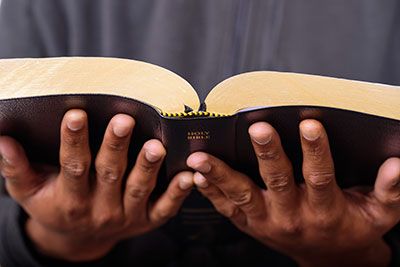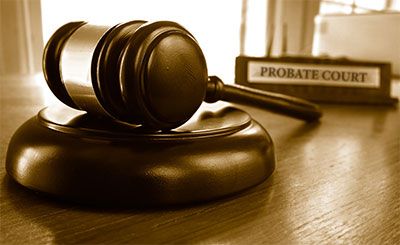Many people without immediate family choose to support the mission of their church or charity by leaving a bequest in their will or trust. While family members are the top priority in most estate plans, religious organizations commonly are included as beneficiaries. For your plan to succeed, it's important to follow formalities and seek professional assistance.
The walls of historic Summit Church near Davenport, Iowa, were ready to buckle. For years, rainwater seeped into the basement, causing the foundation to crumble.
The historic chapel, a place of worship for local families since 1858, was in danger.
Then, as church leaders worked for a solution, their prayers were answered.
They learned that a member of one of those families had recently died and left behind an unexpected bequest. The generosity of a childless widow would pay for the repairs.
Janette Barr and her husband attended the modest chapel and farmed nearby land for many years before moving to Florida. Mrs. Barr lived alone for more than a decade after her husband passed away. She died in 2014 at age 92 and was survived by some nieces and nephews. Although she resided far from the cornfields of her youth, the charming old church with the red roof remained close to her heart.

The “sizable” bequest she left in her estate for the preservation of Summit Church saved a building that predated the Civil War and was owned by the cash-strapped county historical society. A headline in the hometown paper trumpeted the news: “Donation stabilizes historic church.”
“The donation was a pleasant surprise to members of the historical society,” the newspaper reported.
In her honor, a scale model of her nearby farm that includes a house, barn and outbuildings is on permanent display in the church foyer.
Mrs. Barr certainly made an impact on her community and her grateful fellow parishioners. But she planned it that way.
When Vera Hill of Rockland, Maine, died in April 2018 at age 92, she had outlived her immediate family. In her estate plan, Mrs. Hill not only gave back to her hometown, but she also honored the two most important men in her life.
Active for decades with her church, Mrs. Hill left the bulk of her estate to two local parishes in memory of her late husband and brother.
With her generosity, she paid lasting tribute to her family and will benefit her two favorite churches for years to come.
Mrs. Barr and Mrs. Hill are just two examples that show how your estate plan can be “one of the most profound manifestations of your own values,” says a Forbes report on leaving a legacy to charities. “In making the decision about where their money goes, people often end up with a deeper understanding of themselves, what matters most to them, and why.”
I don't have immediate survivors. Why plan?
Even those without children or immediate family members still have causes that are meaningful to them.
Because Mrs. Barr and Mrs. Hill had a plan for their assets, they were able to name their local churches as beneficiaries. By planning, they achieved two goals when they honored the memories of loved ones by giving to their favorite charities.
Without an estate plan, their good-news stories wouldn't exist.
Had they lacked an estate plan, a probate court would have distributed their assets under rigid state intestacy laws to their closest surviving relatives - no matter if they are a distant and unknown niece or nephew. What's worse, their favorite charities would get nothing.
Older people without immediate family members may presume they have “outlived” all their close relatives and lack motivation to create or update their plan. That's unfortunate, because if you don't have a plan - a properly executed will at minimum - a court will make choices for you based on intestacy laws. Those laws distribute assets only to the closest living relatives (who can be very distant relatives) and exclude churches and charities.
Good intentions are not a plan. They need to be properly stated in legal documents, such as a last will and testament or a revocable living trust.
Is a will my best option?
A will-based plan is a start, but your estate will be subject to the public process of probate and the inherent exposure to claims and legal challenges. If you lack immediate survivors, distant relatives lurk as potential heirs, and they can easily contest your will. Children or other close family members who are disinherited in favor of a charity also may resort to litigation.
In addition, a will-based plan can face claims of undue influence on the testator or challenges based on the testator's competence to execute a will. Legal experts say that when a will assigns significant assets to a charity, it has a greater risk of being overturned because of the presumption that family members are the obvious heirs.
It's also common for disinherited or distant family members to claim that a clergy member or member of a charitable organization had undue influence over the decedent's will, especially if the document was signed close to the date of death. Wills that dramatically depart from naming traditional beneficiaries - especially children, grandchildren and siblings - face a substantial increase in the likelihood they will be cast aside, experts say. Wills contested over alleged unnatural distributions cause delays, add to legal expenses and put your plan at risk.
Are there advantages to charitable giving with a trust?
Whether your intention is to memorialize a loved one, gain self-satisfaction or help a church build and grow its ministry, it's important to ensure your plan doesn't fail over formalities or legal challenges.
Fortunately, there are strategies to help your plan succeed. One key strategy, using a revocable living trust, will make your plan less likely to face legal challenges from would-be heirs. A will must be proven as valid in court after the testator's death to be effective and is a matter of public record. In contrast, a trust is a private contract that's created and controlled by you. Also, a trust is effective during and after the life of the grantor and bypasses the publicity and exposure of probate that invites outside challenges.
Through your trust, you determine how assets will be distributed. Your trust can direct a specific dollar amount or percentage of your estate be given to the church. Some people choose to leave the residual of their assets, or what's left over, after other beneficiaries and obligations are paid.
Unlike trust-based plans, will-based plans are easily challenged by disgruntled relatives or other claimants.
Should I seek estate planning advice?
Your success can depend on following formalities, and there are many other ways your plan can go wrong. That's why many charities suggest consulting with an attorney when creating your estate plan.
For example, failure to use the official name and correct Tax Identification Number (TIN) of the church or organization in your will or trust will likely lead to your plan's downfall. The good news is that your religious institution likely has brochures or an online site with information and instructions for charitable giving. The instructions should include two critical elements: the exact legal name of the nonprofit or 501(c)(3) entity and the entity's federal TIN.

Keep in mind that your gift to a religious organization or other charity also provides an opportunity for tax efficiency when funded with retirement accounts. Assets from IRA and 401(k) accounts are subject to income tax when left to a person. A charity will not have to pay income taxes on the retirement account proceeds.
Formality is important because if your will has the wrong name or TIN listed, your bequest can go to the wrong entity or revert back to your probate estate for distribution to an unintended recipient. Or consider what happens when people mistakenly name the pastor - not the church - as the beneficiary, and the money winds up in the wrong hands. Inattention to detail could cause your estate to lose a charitable tax deduction or increase the odds of a legal challenge over the assets.
Even though you may not have children or close relatives, you still have an opportunity to leave a meaningful legacy if you create an estate plan. Those without immediate family members commonly include religious organizations and charities as beneficiaries and pay tribute to loved ones with their gifts. Bequests provide an important source of funding that sustains charitable organizations, and donors often are honored for their posthumous generosity.



